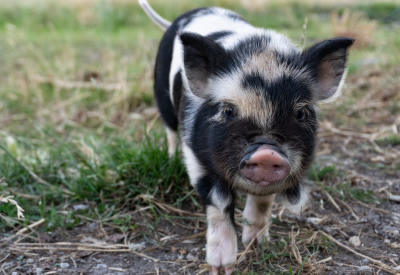When do Pigs Need Mineral Supplementation?
Most commercial feedstuffs do have recommended vitamins and trace minerals that pigs need. However, some of these nutrients are lost or become less bioavailable after drying, storing, processing, and transporting. Following a consistent mineral program paired with unlimited access to fresh water can help your herd ward off mineral deficiencies.
Fill in Dietary Gaps
Feed and forage quality can vary a lot due to geography, weather, and growing or storage conditions. Keeping your pigs on a trace mineral program helps fill in the gaps in their diet, especially those on grain or oilseed based diets, which are commonly lower in minerals.
Life Stage Mineral Needs
Different life stages can increase the nutritional demand on your pigs’ bodies:
- Growth stages: Piglets, weaners, and growers can all experience rapid growth rates. They need extra iron, phosphorus, and calcium to make sure their bodies don’t strip minerals from their systems (especially skeletal) to meet their needs.
- Reproduction stages: Sows and gilts need extra calcium, phosphorus, and magnesium to help them during pregnancy and lactation. Boars often need extra trace minerals like zinc and selenium to support their reproductive health.
- Times of stress: Pigs need adequate mineral supplementation during any illness and recovery period, as well as during environmental stress such as extreme heat, cold, or transportation.
Mineral Deficiency Signs in Pigs
Remember that not all mineral deficiencies have obvious, external symptoms, so prevention will always be better than trying to spot and correct problems in your animals. Here are some common pig mineral deficiency signs to watch out for:
- Lameness, rickets, or osteoporosis: Calcium, phosphorus, and vitamin D deficiencies can cause metabolic bone diseases. Their bodies try to mobilize or strip these minerals from their bone reserves when they are not getting enough (especially during lactation), leading to fractures, lameness, and weak bones.
- Stunted growth: decreased growth performance can be caused by a deficiency in any essential macro or micro mineral, but is most commonly due to low iron, sodium chloride, zinc, copper, iodine, and selenium levels.
- Jaundice or other skin problems: caused by copper and or zinc deficiency
- Anemia: if piglets are pale and retaining fluid around their throat, they are likely anemic and needing additional iron and copper.
- Lethargy and goiters: iodine deficiency is usually behind goiters (enlarged thyroids) and weakness or lethargic energy.
- Nutritional diseases: white muscle disease, mulberry heart disease and sudden death are typically signs of selenium and vitamin E deficiencies.
- Lower reproduction rates: low breeding performance can be caused by several deficiencies, but is commonly tied with low selenium, magnesium, manganese, and vitamin E intake.
What Minerals do Pigs Need?
There are 15 essential macro and micro minerals that swine need in order to stay healthy. Macro-minerals are needed in larger amounts and micro-minerals (trace minerals) are needed in smaller or trace amounts.

Essential Macrominerals for Pigs
- Calcium and Phosphorus: bone and lean tissue building, muscle contraction, blood clotting, metabolism. The ratio of total calcium to total phosphorus should be kept between 1.25:1 and 1:1 so both minerals don’t interfere with each other.
- Sodium Chloride (sodium + chlorine): electrolyte, pH balance. Need is greater in nursery pigs and decreases in finishing pigs.
- Magnesium: electrolyte, bone formation, cofactor of more than 300 enzymes
- Potassium: electrolyte, neuromuscular function, works with sodium to help with nutrient absorption
- Sulfur: forms important amino acids
Essential Microminerals (Trace Minerals) for Pigs
- Zinc: enzyme formation, metabolizes carbohydrates/proteins/lipids
- Copper: enzyme formation, iron absorption, creation of hemoglobin, tissue pigmentation, cellular respiration.
- Iron: enzyme formation, creation of hemoglobin
- Manganese: enzyme formation, bone development
- Iodine: thyroid hormone function, metabolism
- Selenium: antioxidant, immune defense, enzyme formation
- Chromium: a cofactor with insulin
- Cobalt: component of vitamin b12
Redmond Mineral Program for Pigs
Redmond Minerals offers all natural products with a full spectrum of sea minerals that are highly bioavailable to your pigs. The combination of our 10 Fine mineral salt and our volcanic Conditioner fills in the gaps in your pigs’ diet and helps them get the most value out of their feed.

Growing and finishing pigs need strong gut integrity to prevent pathogens from passing into their bloodstream and allow them to absorb more nutrients. Redmond Conditioner contains natural bentonite clay to improve feed intake, bind to harmful toxins, and regulate digestion for better health, even on lower quality feed. After pairing of our volcanic and sea minerals, customers are happy to report a wide range of benefits:
- Stronger legs and hooves
- Better weight gains
- Healthier litters
- Lower ammonia levels
- Better weaning health
- Improved feed conversion and feed intake
- Greater milk production
- Higher meat quality
Give Redmond a call today at  so we can help improve the health of your herd and get you back to what you love about raising animals!
so we can help improve the health of your herd and get you back to what you love about raising animals!
© 2024 Redmond Minerals Inc.

